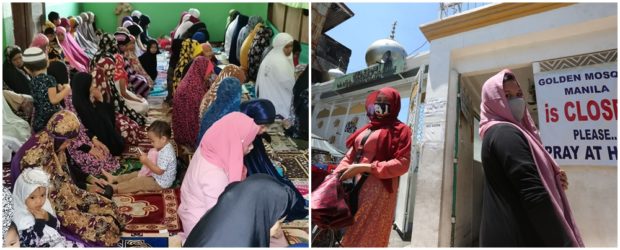
‘ONLY ALLAH KNOWS WHAT IS HAPPENING’ More than a hundred Maranaos gather in a mosque in Baloi, Lanao del Norte province, on Sunday. But the Golden Mosque (right photo) in Quiapo, Manila, is closed amid the continuing threat of the new coronavirus. —DIVINA SUSON/MARIANNE BERMUDEZ
MANILA, Philippines — Muslims around the world began marking a somber Eid al-Fitr on Sunday, many under coronavirus lockdown, but lax restrictions offer respite to worshipers in some countries despite fears of skyrocketing infections.
The festival, one of the most important in the Muslim calendar marking the end of the holy month of Ramadan, is traditionally celebrated with mosque prayers, family feasts and shopping for new clothes, gifts and sweet treats.
But this year, the celebration is overshadowed by the fast-spreading respiratory disease, with many countries tightening lockdown restrictions after a partial easing during Ramadan led to a sharp spike in infections.
Further dampening the festive spirit, multiple countries—from Saudi Arabia to Egypt, Turkey and Syria—have banned mass prayer gatherings, a festival highlight, to limit the spread of the disease.
Round-the-clock curfew
Saudi Arabia, home to Islam’s holiest sites, began a five-day, round-the-clock curfew from Saturday after infections more than quadrupled since the start of Ramadan to around 68,000—the highest in the Gulf.
Eid prayers will be held at the two holy mosques in the cities of Mecca and Medina “without worshipers,” authorities said on Saturday, citing a royal decree.
Mecca’s Grand Mosque has been almost devoid of worshipers since March, with a stunning emptiness enveloping the sacred Kaaba—a large cube-shaped structure toward which Muslims around the world pray.
Jerusalem’s Al-Aqsa mosque, Islam’s third holiest site, will reopen only after Eid, its governing body said.
Iran, which has experienced the Middle East’s deadliest outbreak, has called on its citizens to avoid travel during Eid as it battles to control infection rates.
The exact date of Eid has yet to be set in the Shiite-majority country, but will likely be on Monday, in line with the Shiite community’s celebrations in Iraq, as announced by top cleric Grand Ayatollah Ali al-Sistani.
Sunnis in Iraq will mark the start of the festival on Sunday.
Flouting guidelines
Muslims across Asia—from Indonesia to Pakistan, Malaysia and Afghanistan—thronged markets for prefestival shopping, flouting coronavirus guidelines and sometimes even police attempts to disperse large crowds.
“This feast is for the kids, and if they can’t celebrate it with new garments, there is no point in us working so hard throughout the year,” said Ishrat Jahan, a mother of four, at a bustling market in the Pakistani city of Rawalpindi.
Pakistan, which gave into religious pressure by allowing mosque prayers throughout the fasting of Ramadan, has yet to make a decision over mass gatherings during Eid.
In Indonesia—the world’s most populous Muslim nation—people are turning to smugglers and fake travel documents to get around bans on the annual end-of-Ramadan travel that could send infections soaring.
In the Philippines, more than a hundred Maranaos gathered at a mosque in Baloi, Lanao del Norte province, on Sunday to celebrate the end of Ramadan.
Hadji Sirad Abdul-asis, Imam of Baloi mosque, said worshipers gathered for prayers at the mosque despite guidelines asking them not to do so because they were not afraid of the virus.
At least 150 residents, among them men, women, children and even people with disability, flocked to the mosque located just along a national highway at 6 a.m.
“We survived for two months and no one died of the virus here in Baloi. That means, only Allah knows what is happening,” Abdul-asis said.
“Even before, we never allowed the sick to go to the mosque,” he added.
Mayor Hanifa Ali told the Inquirer, “We will investigate, we will call the attention of the barangay captain because we have an executive order reiterating the guidelines of the national Inter-Agency Task Force on Emerging Infectious Diseases prohibiting all forms of social gatherings.”
In Marawi City, at least 30 members of the Abdulrachman family, including more than 10 grandchildren, gathered at the family’s ancestral house for the grand prayer on Sunday morning.
But the family’s matriarch, Sapia Abdulrachman, lamented that not all family members were able to come.
“They could not make it because children are not allowed to travel,” she said.
‘Breaking down barriers’
Son-in-law Alan Balangi Amer said, “We are sad. We have not yet moved on from the siege, many of our fellow Maranaos have not returned home and yet again, we have to deal with this pandemic.”
In his message for Eid-al Fitr, President Duterte said in part, “As you further carry out your role as stewards of peace, love and understanding, I trust that you will remain committed in breaking down barriers that divide and further estrange us from one another.”
Vice President Leni Robredo, in her message, said, “We see the many ways that Eid-al Fitr and the past holy month of Ramadan strengthened the linkages among Muslim Filipinos.”
“We see it in friends reaching out and checking on each other online during fasting; in Muslim business owners extending compassion to their staff; in leaders who advocate peace and put their constituents front and center in their agenda,” she said. —REPORTS FROM AFP, DIVINA M. SUSON, JULIE M. AURELIO AND JHESSET O. ENANO INQ